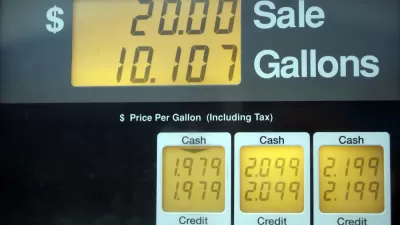Freed from the political constraints of holding a cabinet position, former Secretary of Transportation Ray LaHood told a university audience that the increase is necessary to meet multi-modal infrastructure needs, not just road construction.
LaHood, one of the few Republican members of President Obama's cabinet, served as Transportation Secretary from 2009 until he was replaced by Charlotte, N.C. Mayor Anthony Foxx last July.
Initially some questioned his credentials to serve as overseer of the nation's transportation infrastructure, but he soon convinced many of his doubters that he was up to the job, taking on such unconventional causes as bicycling, high speed rail, and warning of the dangers of distracted driving. In fact, Streetsblog Capitol Hill's Tanya Snyder argued here that "Obama's top transportation achievement (was) his decision to name Ray LaHood as U.S. DOT secretary".
However, President Obama prevented LaHood from speaking on the need to increase the gasoline tax or consider vehicle-miles-traveled fees as noted here and here in March and February of 2009. No longer.
At a forum on next generation transportation systems held at George Mason University's Arlington campus on Oct. 16, LaHood did not hold back, to the delight of the audience, captured by WAMU's Martin Di Caro.
He called on lawmakers to raise the federal gas tax — last increased in 1993 to $.18 per gallon...In addition to the gas tax, LaHood said the federal and state governments should consider VMT taxes, public private partnerships, and tolling to raise transportation funds.
That was the first part of his message to the "businessmen, smart growth advocates, and transportation planners" and students in attendance. The second part lived-up to his legacy as a reformer at DOT. Laying pavement is no longer enough. Instead, a multi-modal approach must be advanced.
The U.S. Department of Transportation's priorities have been building and repairing roads and bridges, LaHood said, but the federal government must now come up with money to help states, cities, and towns build high-speed rail lines, streetcar systems, and even bike sharing programs.
"So the debate now is how do we pay for all the things we need in infrastructure? How do we help these communities like Arlington County and other areas of the country that want walking and biking paths, that want Safe Routes to School, that want the opportunity for bus rapid transit, that want a streetcar line, that want high-speed rail?" LaHood said.
His recommendation: "The highway trust fund has been a good source of funding. It can't be the only source of funding. I believe Congress ought to raise the gas tax ten cents a gallon and index it. If the gas tax had been indexed in 1993 we wouldn't be having this debate," LaHood said.
Following in the recent footsteps of Senator Barbara Boxer (D-Calif), chair of the Senate's Environment and Public Works Committee, and Congress, he viewed Virginia's new transportation funding law as a model to consider.
LaHood said Virginia, recognizing the diminishing rate of return of its state fuel tax, thought "outside the box" in raising its sales tax instead to fund transportation.
On Monday, Oct. 21, Thomas J. Donahue, president of the U.S. Chamber of Commerce, repeated LaHood's recommendation to raise the gas tax to address America's failing transportation infrastructure.
"It's one of the few economic policy ideas that big business groups and big labor unions agree on, wrote CNN's Jennifer Liberto, notwithstanding the fact that "(a) higher gasoline tax would be extremely unpopular in a country where almost 90% people drive to work."
Unlike LaHood, Donahue did not stress a multi-modal approach toward transportation spending. Donahue might also not have endorsed Virginia's replacement of the gas excise tax with a general sales tax, as LaHood did, considering that last January he declared that "gasoline excise taxes are not taxes but user fees".
FULL STORY: Filed Under: Transportation Former Transportation Secretary Calls On Congress To Raise Gas Tax

Planetizen Federal Action Tracker
A weekly monitor of how Trump’s orders and actions are impacting planners and planning in America.

Maui's Vacation Rental Debate Turns Ugly
Verbal attacks, misinformation campaigns and fistfights plague a high-stakes debate to convert thousands of vacation rentals into long-term housing.

Restaurant Patios Were a Pandemic Win — Why Were They so Hard to Keep?
Social distancing requirements and changes in travel patterns prompted cities to pilot new uses for street and sidewalk space. Then it got complicated.

In California Battle of Housing vs. Environment, Housing Just Won
A new state law significantly limits the power of CEQA, an environmental review law that served as a powerful tool for blocking new development.

Boulder Eliminates Parking Minimums Citywide
Officials estimate the cost of building a single underground parking space at up to $100,000.

Orange County, Florida Adopts Largest US “Sprawl Repair” Code
The ‘Orange Code’ seeks to rectify decades of sprawl-inducing, car-oriented development.
Urban Design for Planners 1: Software Tools
This six-course series explores essential urban design concepts using open source software and equips planners with the tools they need to participate fully in the urban design process.
Planning for Universal Design
Learn the tools for implementing Universal Design in planning regulations.
Heyer Gruel & Associates PA
JM Goldson LLC
Custer County Colorado
City of Camden Redevelopment Agency
City of Astoria
Transportation Research & Education Center (TREC) at Portland State University
Jefferson Parish Government
Camden Redevelopment Agency
City of Claremont



























